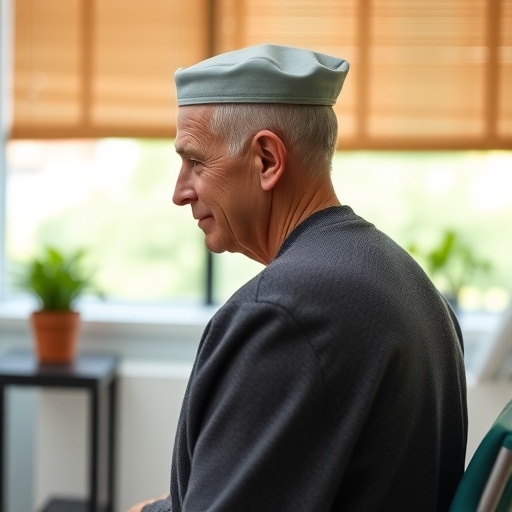In recent years, there has been a growing emphasis on the psychological and physiological well-being of patients recovering from strokes. Among the multitude of factors influencing recovery, the intervention strategies employed play a critical role in alleviating the symptom burden faced by these patients. A new randomized controlled trial has emerged, illuminating the effectiveness of an innovative intervention grounded in Cox’s interaction model of client health behavior. This study, spearheaded by researchers Ma, Tang, and Li, aims to assess the potential of this approach in a nuanced and comprehensive manner.
The primary foundation of the intervention lies in Cox’s interaction model, which fundamentally explores the dynamic interplay between individual behaviors, environmental factors, and health outcomes. This model posits that effective health interventions must address both personal agency and the contextual elements that shape patient experiences. By implementing this framework, the study seeks to bring forth a comprehensive understanding of how stroke patients can take active roles in their recovery journey, potentially leading to improved symptom management.
Participants in the trial encompassed a diverse cohort of post-stroke individuals, each grappling with their unique challenges and symptom presentations. Prior to the intervention, these participants underwent extensive evaluations, allowing researchers to classify their symptom burden accurately. This approach not only ensured a tailored intervention process but also provided a metrics-based foundation to evaluate its overall efficacy in real-world settings.
Throughout the course of the trial, participants were subjected to a range of educational and interactive sessions designed to enhance their understanding of symptom management strategies. These sessions were also complemented by personalized outreach efforts that encouraged ongoing communication between patients and healthcare providers. Such consistent engagement proved crucial in cultivating a sense of community and support among participants, thereby reinforcing their commitment to the recovery process.
One of the standout features of the trial was the incorporation of technology to facilitate real-time feedback and monitoring. Participants utilized mobile applications to track their symptoms and report any changes or concerns, empowering them to take charge of their health more effectively. This active participation not only enhanced their self-efficacy but also allowed healthcare providers to adjust intervention strategies in a timely manner based on individual needs.
Moreover, encouraging mindfulness and emotional resilience emerged as essential components of the intervention. Handling the psychological aftermath of a stroke can be daunting, and the trial tackled this head-on by presenting strategies aimed at reducing anxiety and fostering a positive outlook. Mindfulness exercises, coupled with cognitive-behavioral techniques, provided participants with practical tools to manage stress, ultimately enhancing their overall quality of life.
The preliminary results of the trial have shown promising outcomes regarding the reduction of symptom burden among participants. Variations in physical, emotional, and cognitive symptoms were reported, with many participants expressing significant improvements in their overall health status. This seminal work not only validates the importance of evidence-based interventions but also emphasizes how individual experiences can be transformed through proactive health behaviors and holistic care approaches.
Furthermore, the researchers are keenly aware of the potential implications of their findings on broader healthcare practices. By demonstrating the effectiveness of an intervention that marries theory with practical application, they hope to inspire other healthcare systems to adopt similar models of care tailored for other chronic conditions. The flexibility of Cox’s interaction model allows for a spectrum of adaptations, meaning that its principles can be applied to various patient cohorts, thus widening the scope of its impact.
As the study progresses, researchers plan to disseminate their findings widely through publications and conferences to elevate awareness surrounding post-stroke recovery strategies. Their goal is to engender a paradigm shift in how healthcare practitioners approach recovery beyond the clinical environment, fostering a system that prioritizes patient empowerment and collaborative care models.
In conclusion, the trial led by Ma, Tang, and Li represents a transformative step forward in understanding how health behavior interventions can make a tangible difference in the lives of post-stroke patients. By embracing an integrative approach that combines patient education, ongoing support, and technological engagement, the study is poised to inform future healthcare practices. As healthcare continues to evolve, insights gleaned from this research may serve as a cornerstone for developing robust intervention programs that prioritize patient participation and self-management, ultimately leading to better health outcomes.
This innovative study serves as a beacon of hope for those affected by strokes, emphasizing that with the right support and resources, the daunting journey of recovery can be navigated successfully. The intersection of rigorous scientific methodology and genuine patient care embodies the future of healthcare solutions for chronic conditions, resonating with healthcare professionals and patients alike.
Ultimately, as the research progresses, the hope is that the findings will pave the way for broader discussions on the role of interactive, patient-centered models in managing health post-stroke. Harnessing the potential of Cox’s interaction model could set new standards in the field of nursing and rehabilitation, demonstrating the powerful impact of engaged and informed patients on their recovery paths.
Subject of Research: The effectiveness of an intervention based on Cox’s interaction model for reducing symptom burden among post-stroke patients.
Article Title: Effectiveness of an intervention based on Cox’s interaction model of client health behavior for reducing symptom burden among post-stroke patients: a randomized controlled trial.
Article References:
Ma, S., Tang, Q., Li, S. et al. Effectiveness of an intervention based on Cox’s interaction model of client health behavior for reducing symptom burden among post-stroke patients: a randomized controlled trial. BMC Nurs 24, 1227 (2025). https://doi.org/10.1186/s12912-025-03833-z
Image Credits: AI Generated
DOI:
Keywords: Stroke recovery, Cox’s interaction model, symptom management, patient empowerment, randomized controlled trial.




